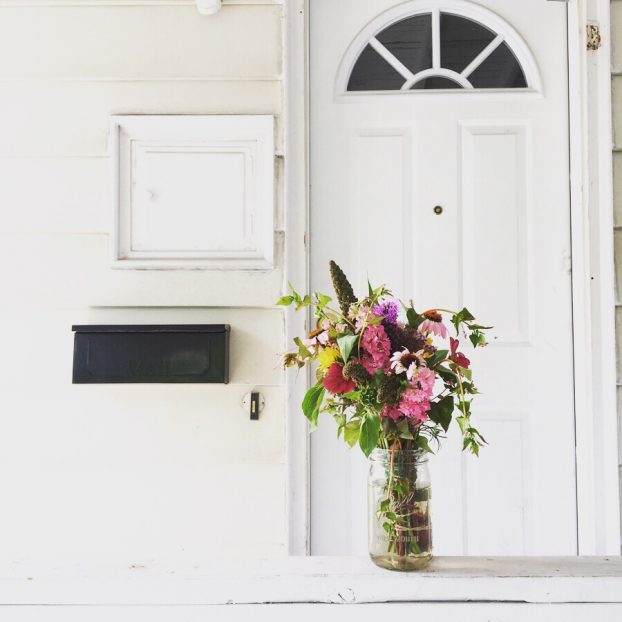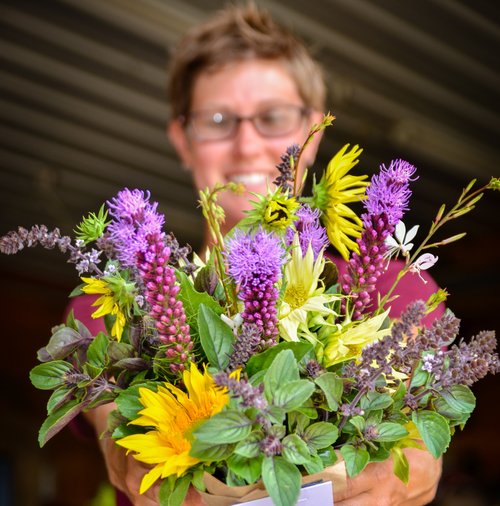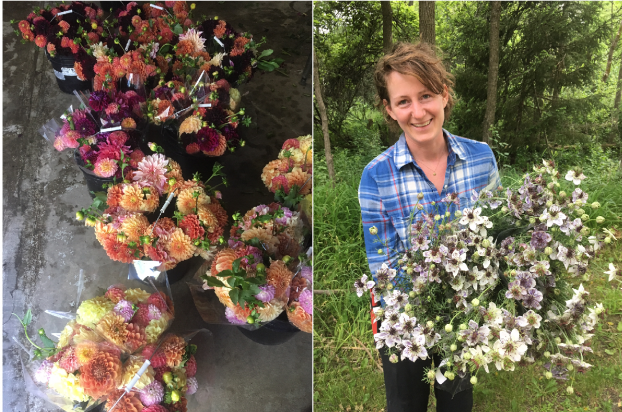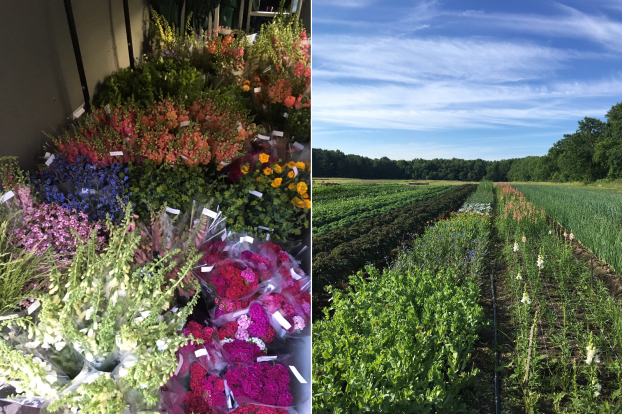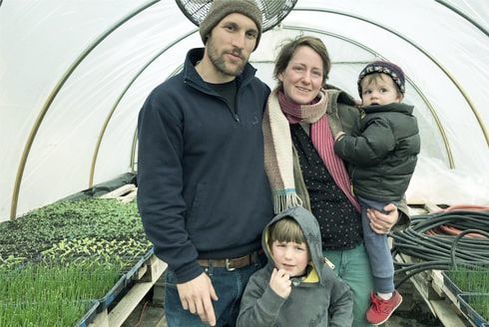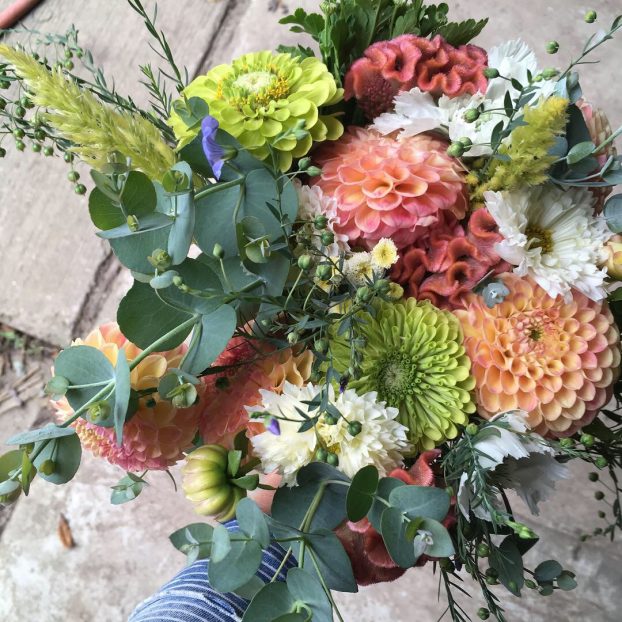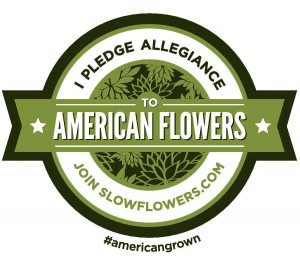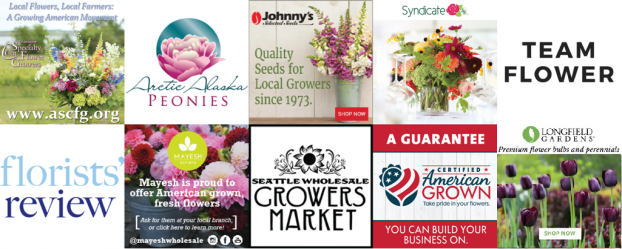Podcast: Play in new window | Download
Subscribe: Apple Podcasts | Podcast Index | RSS | More
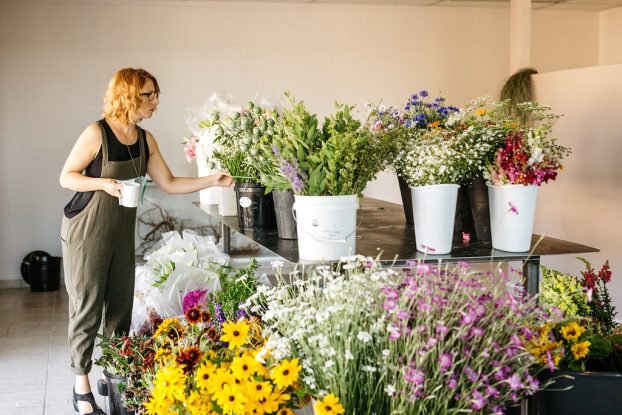
Opening day of the Michigan Flower Growers Co-op, with one of the first customers, Susan McLeary of Passionflower.
I’m so excited to have you with me today because in addition to our fabulous episode addressing the timely topic of Regional Wholesale Flower Hubs, I want to announce the opening of Early Bird Pre-Registration for the 2019 Slow Flowers Summit!
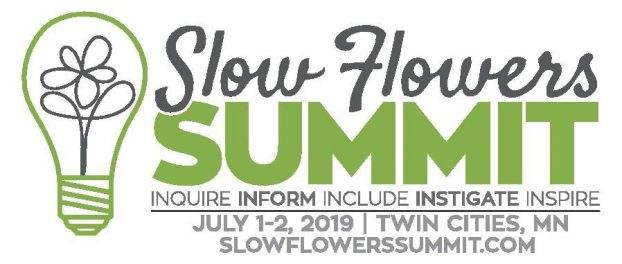 Yes, it’s so great to be able to unveil our program for the 3rd annual Summit, which will take place on July 1 & 2nd 2019 in St. Paul Minnesota, co-hosted with Twin Cities Flower Exchange. Find all the details here, at slowflowerssummit.com.
Yes, it’s so great to be able to unveil our program for the 3rd annual Summit, which will take place on July 1 & 2nd 2019 in St. Paul Minnesota, co-hosted with Twin Cities Flower Exchange. Find all the details here, at slowflowerssummit.com.
The Slow Flowers Summit is designed to meet the needs and interests of progressive floral entrepreneurs engaged in sustainable sourcing, design and business practices. Your registration covers local flower tours, floral demonstrations, participation in creating an interactive, large-scale installation, all meals and 10 inspiring and informative speakers from across the floral continuum.
Now’s your chance to take advantage of early-bird pricing through December 31st.
- Slow Flowers members enjoy the discounted registration of $275
- General admission is $325.
- Ticket prices at both levels will increase by $100 on January 1st so if you want to drop hints for a holiday-wish list or if you want to invest in an tax-deductible business expense before the end of the year, the Summit registration might just have your name on it! I can’t wait to see you there!
As I mentioned, the Summit’s co-host is Twin Cities Flower Exchange and our partner is founder Christine Hoffman, a past guest of this podcast. Christine’s innovative efforts to create a regional wholesale flower hub in the Twin Cities is one of the reasons I wanted to bring the Summit there. As part of our Summit programming, Christine will be joined by two other leaders in farm-to-florist wholesaling. Theirs are important, emerging models we’re witnessing in markets around North America.
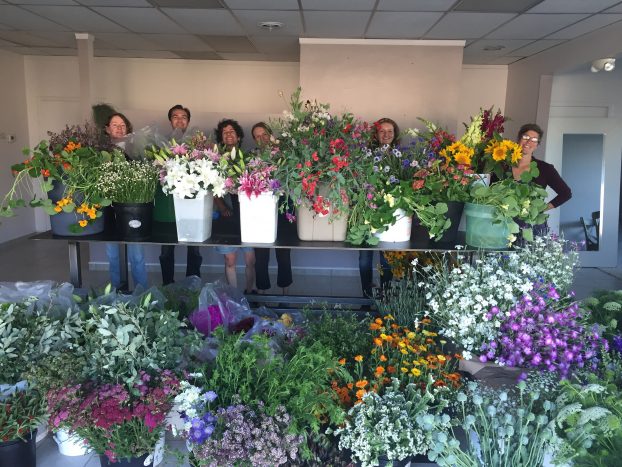
The Michigan Flower Growers Cooperative is a magnetic hub of flowers, flower farmer and floral designers.
It’s timely that one of Christine’s fellow panelists is with us today, along with one of her collaborators. Please welcome farmer-florist Amanda Maurmann of Gnome Grown Flowers and Alex Cacciari of Seeley Farm. Together, they represent the exciting Michigan Flower Growers Cooperative.
Amanda will join Christine at the Summit to share insights, lessons learned and strategies for how the Michigan Flower Growers Cooperative came to be; our third panel presenter will be Nichole Skalski of Sonoma Flower Mart, a past guest of this podcast.
The session will explore various models and strategies for developing a local-flowers-focused regional wholesale flower hub. I’ve heard from so many around the country who are hungry for this type of insight and resource — and I know it will be a valuable addition to the Summit programming.
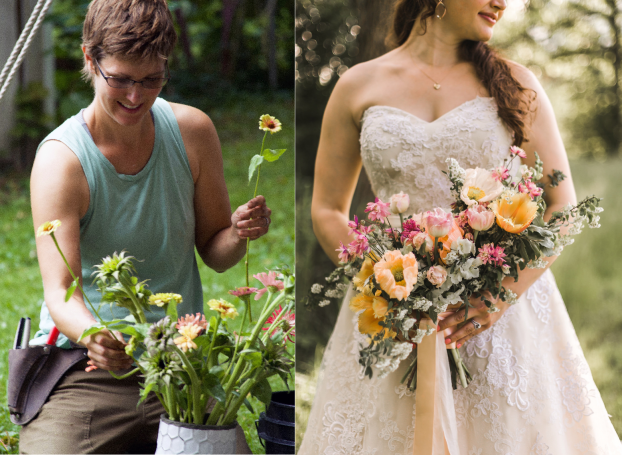
Farmer-florist Amanda Maurmann of Gnome Grown Flowers, along with one of her Michigan-grown bouquet designs.
Let me tell you a little more about both guests. Amanda and her family own and run a small cut flower farm and design studio out in Ann Arbor, Michigan. She utilizes organic and sustainable practices and loves growing a diversity of unique and interesting blooms that inspire creative and natural design.
She designs for small weddings, events, and funerals, and also cooperates with local farms that provide u-pick flowers for the public. Amanda works with what is in season first, and loves to collaborate with other local growers.
Alex Cacciari and her husband Mark Nowak own and operate Seeley Farm in Ann Arbor. They grow certified organic vegetables and cut flowers for sale to farmers’ markets, chefs and grocery stores.
Alex says she got bit by the flower bug five years ago when she planted two beds of mixed flowers as an afterthought, along with the vegetable plantings.
Those two beds quickly grew to almost a half acre of mixed annual flowers and foliage, an expanding collection of dahlias, and new perennial plantings every year. Alex likes to arrange with unique ingredients like foraged greenery, vegetables and herbs. She also has been experimenting with lots of everlasting varieties as a way to enjoy locally grown flowers all season long.
In 2016, Amanda and Alex, along with a cohort of other flower growers, started the Michigan Flower Growers’ Cooperative to serve the needs of growers through marketing and distribution of their products to the wholesale market.
Thanks so much for joining me today as you heard the story of a new model for selling locally-grown flowers in Michigan and enjoyed a wonderful preview to the upcoming presentation, Farm-to-Florist: Seeding and Growing a Regional Flower Hub, at the 2019 Slow Flowers Summit.
Take time to visit the link above to learn more about the amazing program, people and flowers you’ll engage with next summer. It’s not too early to save the date and secure your seat!
We have a vital and vibrant community of flower farmers and floral designers who together define the Slow Flowers Movement.
As our cause gains more supporters and more passionate participants who believe in the importance of the American cut flower industry, the momentum is contagious.
I know you feel it, too. I value your support and invite you to show your thanks and with a donation to support my ongoing advocacy, education and outreach activities. You can find the donate button in the column to the right.
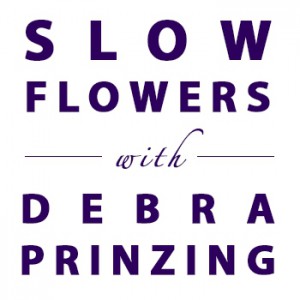 The Slow Flowers Podcast has been downloaded more than 369,000 times by listeners like you.
The Slow Flowers Podcast has been downloaded more than 369,000 times by listeners like you.
Thank you for listening, commenting and sharing – it means so much.
Thank you to our sponsors who have supported Slow Flowers and all our programs.
Florists’ Review magazine. I’m delighted to serve as Contributing Editor for Slow Flowers Journal, found in the pages of Florists’ Review. It’s the leading trade magazine in the floral industry and the only independent periodical for the retail, wholesale and supplier market.
Arctic Alaska Peonies, a cooperative of passionate family farms in the heart of Alaska providing bigger, better peony flowers during the months of July and August. Visit them today at arcticalaskapeonies.com
Seattle Wholesale Growers Market, a farmer-owned cooperative committed to providing the very best the Pacific Northwest has to offer in cut flowers, foliage and plants. The Growers Market’s mission is to foster a vibrant marketplace that sustains local flower farms and provides top-quality products and service to the local floral industry. Find them at seattlewholesalegrowersmarket.com
Longfield Gardens provides home gardeners with high quality flower bulbs and perennials. Their online store offers plants for every region and every season, from tulips and daffodils to dahlias, caladiums and amaryllis. Visit them at longfield-gardens.com.
Syndicate Sales, an American manufacturer of vases and accessories for the professional florist. Look for the American Flag Icon to find Syndicate’s USA-made products and join the Syndicate Stars loyalty program at syndicatesales.com.
Johnny’s Selected Seeds, an employee-owned company that provides our industry the best flower, herb and vegetable seeds — supplied to farms large and small and even backyard cutting gardens like mine. Check them out at johnnysseeds.com.
Association of Specialty Cut Flower Growers. Formed in 1988, ASCFG was created to educate, unite, and support commercial cut flower growers. It mission is to help growers produce high-quality floral material, and to foster and promote the local availability of that product. Learn more at ascfg.org
Mayesh Wholesale Florist. Family-owned since 1978, Mayesh is the premier wedding and event supplier in the U.S. and we’re thrilled to partner with Mayesh to promote local and domestic flowers, which they source from farms large and small around the U.S. Learn more at mayesh.com.
Certified American Grown Flowers. The Certified American-Grown program and label provide a guarantee for designers and consumers on the source of their flowers. Take pride in your flowers and buy with confidence, ask for Certified American Grown Flowers. To learn more visit americangrownflowers.org.
And the Team Flower Conference – a professional floral event where flower lovers from all over the world gather for networking, learning, and celebration. It’s a special time for the floral industry to come together and whether you’re a farmer, designer, wholesaler, or just love flowers, you’re invited to attend as Team Flowers dreams big for the industry’s future. Head to teamflower.org/slowflowers to learn more about the 2019 conference in Waco, Texas!
I’m Debra Prinzing, host and producer of the Slow Flowers Podcast.
Next week, you’re invited to join me in putting more American grown flowers on the table, one vase at a time. And If you like what you hear, please consider logging onto iTunes and posting a listener review.
The content and opinions expressed here are either mine alone or those of my guests alone, independent of any podcast sponsor or other person, company or organization.
The Slow Flowers Podcast is engineered and edited by Andrew Brenlan. Learn more about his work at soundbodymovement.com.









